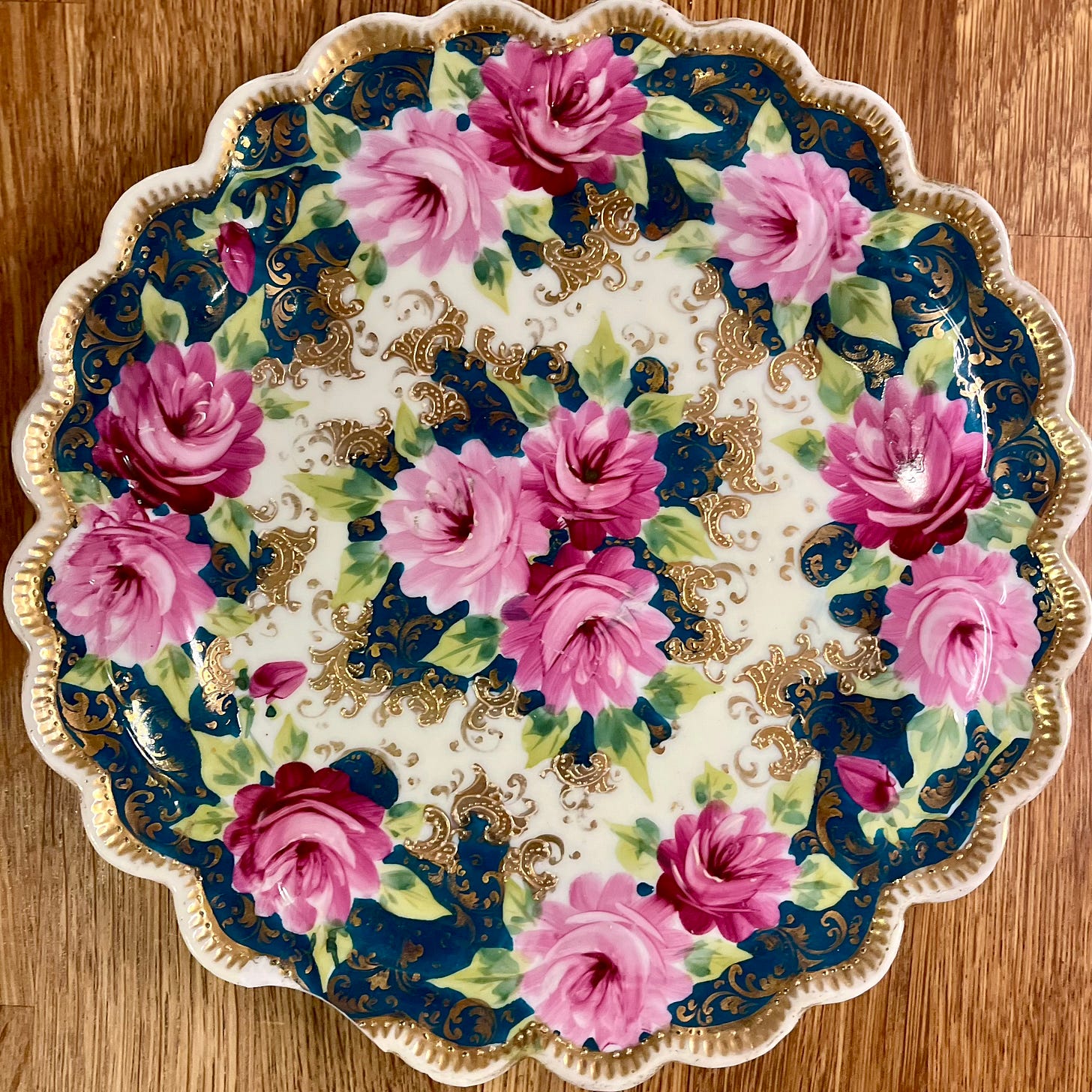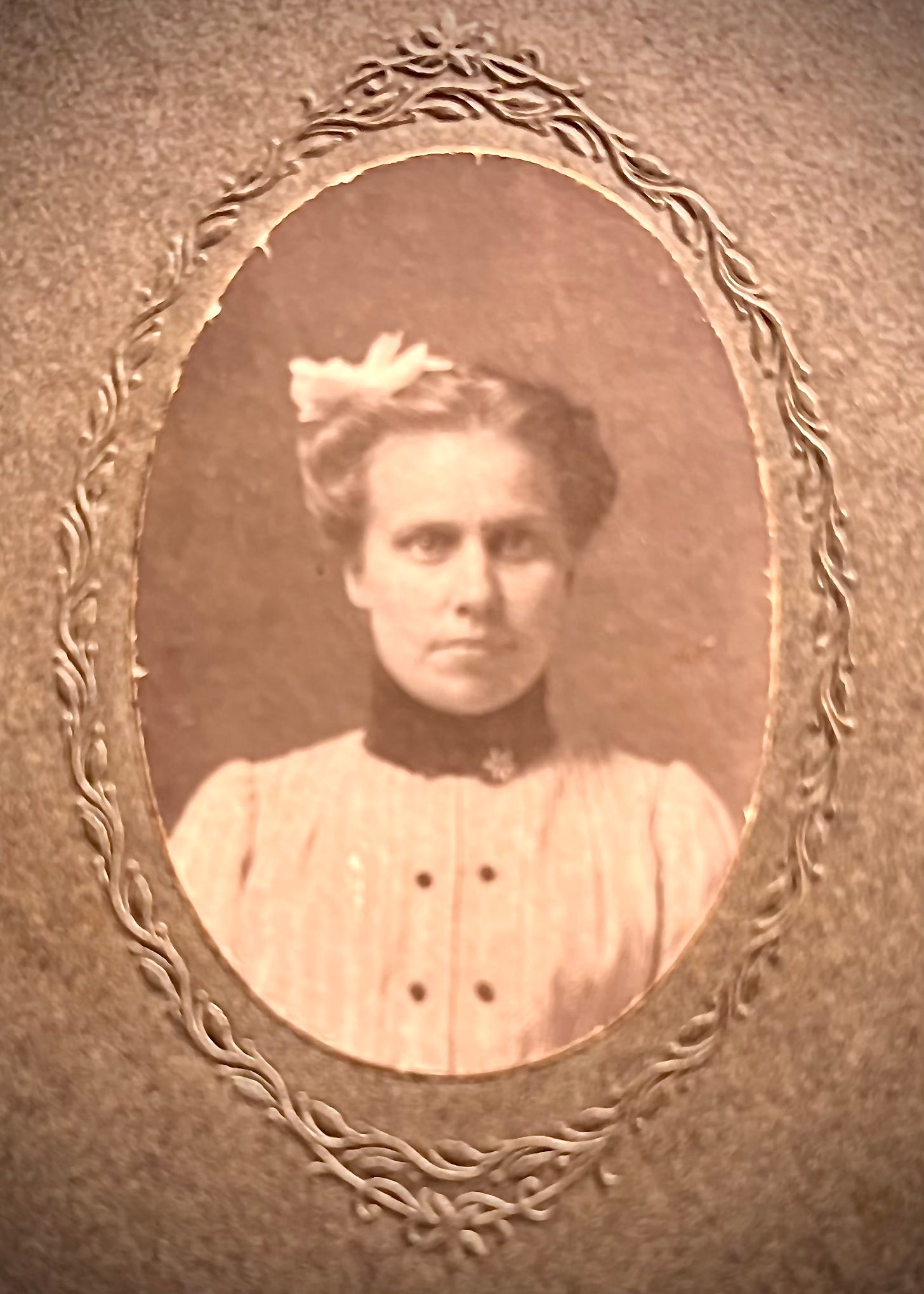“This was your grandmother’s most cherished possession.”
My mother recited these words every spring, as she took the plate out of her cedar chest. The declaration was stilted. Ceremonial. Occasions so charged with emotion called for a script.
“I married her favorite son.”
Setting aside a stack of lace doilies, she lifted the plate and unwrapped it from the pink rectangle that was her one silk scarf. She ran her fingers over the intricate gold filigree, embossed over leaves and flowers in a curlicue design like fancy handwriting. The porcelain shone translucent in the early-spring light from the bedroom window.
“It’s pretty,” I said. It was.
“Should I display it in the dining room? Not with the rest of my china. I can get one of those wire things and attach it to the wall.”
Mom’s china comprised six collectible plates from the Black Hills and some state and national parks, four cup-and-saucer sets we’d given her for Mother’s Day, and the few dishes from her wedding that we hadn’t yet broken. She kept those in a glass-fronted cabinet we had to squeeze past on our way to the kitchen.
“What do you think?”
I wanted to ask why she couldn’t just put it out like a regular plate, with cookies or something. Instead, I shrugged, backing slowly away towards the bedroom door.
“Your cousins might see it. They don’t want me to have it. I have to be able to take it down quick and hide it.”
My cousins. She wasn’t referring to the ones on her side, who were normal-age cousins. She was talking about the grown-up cousins on my Dad’s side. Some of them had kids. I was baffled.
“Someday, this will be yours. Grandma would have wanted you to have it.”
A chipped plate. My grandmother, who was already dead when I was born, wanted to give me something that looked like a bite had been taken out of it. None of it — cousins who were grown-ups but acted like brats, Mom who hid a broken piece of china so my cousins wouldn’t steal it, Grandma who spoke to Mom from the grave — made any sense.
“I’ll put it back. For now.”
I dashed out of the room and out the back door.
For now became forever. Or would have, had I not found it after she died. It was still in her cedar chest, wrapped in her one silk scarf, under a stack of doilies.
I undid the scarf and held the plate in both hands. “Grandma, are you there?” I said out loud.
It was a chilly day. I’d opened the windows to air out the house. The porcelain, and the gold decorating it, was warm to the touch.
“Thanks, Grandma,” I said. I wrapped up the plate in my mother’s one silk scarf and tucked it into my bag.
Every episode of Antiques Roadshow has its jackpot moments. “May I ask how much you paid for this?” the bow-tied expert asks the thrift-store shopper. “At auction, this would go for . . .” A pause full of silent drum rolls, followed by gasps, and “I had no idea!” as the bow-tied expert quotes an amount you could retire on. But there are also painful, public humiliations. Who knew that to strip the varnish from an eighteenth-century desk would cut its retail value by two-thirds? You wouldn’t want to be in that car on the ride home.
My grandmother’s plate isn’t unique. The provenance is clear: a yellowed bit of paper with her name and the date of her marriage taped to the back with brittle cellophane tape. But how does that matter? Who knows, every isolated ranch house in western South Dakota might contain a similar plate. And then there’s that chip, an automatic disqualification. It’s not Antiques Roadshow material.
But the embossed gold, the warmth you feel as you close your eyes and trace the pattern with your fingertips, is a treasure.
It hurts to think of how my mother took the best parts of herself and hid them. What she gave away or destroyed, I will never know.
It wasn’t only the plate or the scarf or the doilies she crocheted. As she aged, fear and longing took her far from the Lutheran church our family had belonged to. She stopped cutting her hair. It stayed attractively blond into her seventies, and grew to her knees. But when she swept it up in a loose bun, as did all of the women of the Fellowship, she looked drab and anonymous. Her new belief system required her to dress in dresses stitched from cheap, harsh calico. The seamstress-quality clothes she’d sewn and worn with pride disappeared into the back of her closet.
Going through her drawers as I readied her house to be sold, I found the cashmere scarves and kid leather gloves, nice jewelry, good watches and luxurious bathrobes I’d given her over the years. They were still in their gift boxes. Opening each one, I found a note in her neat cursive: Too Good to Wear.
Leaning against her bed, I put my head in my arms. Rocking and sobbing, I crushed those notes in my hands.
I wish I could have convinced her she was worthy of her gifts.
I wish I could have convinced myself that I was worthy of mine.
Writer, interrupted.
Messages, spoken or not, seep into us. They carry away the shining particles we all have inside of us.
I’ll put it away. For now. How many times have we told ourselves this?
Now does not have to be forever.
Life is not about hitting the jackpot on Antiques Roadshow. It’s about finding the gold within us. It’s knowing that we would not sell it for any amount.
I like to think that my grandmother knew I would show up after her death, with my fierce hungers. I believe she held two generations of women in her arms. She knew there was gold in me, just as she knew there was in my mother. We all need a surface on which to place our dreams, those little puffs of meringue. Our hopes, spun sugar. Delicate things need protection.
Maybe she saw those hopes and dreams transformed, veining us with the most precious of metals. I run my finger around the scalloped edge of her plate, rubbing the place where a piece broke off. How did it happen?
In every broken, beautiful thing, there is a story.
All subscribers will receive my newsletters in your inbox at least once a week, and can read and comment on all posts. If you value my work and have the means to do so,* please consider becoming a paid subscriber. You’ll get bonus personal notes and a surprise gift or two. Right now, I’m offering annual subscriptions for $35. That’s 30% off the regular price, until the end of time. All readers have my undying gratitude.
*If money is an issue, no worries. Just let me know and I’ll comp you.







Such a poignant and beautiful story, Mary. It makes me think about the hidden, chipped pain wrapped up with your mother's and grandmother's treasured, but hidden-away plate, and that it was passed on to you. Perhaps your mother sensed that only you would have the courage and sensitivity to unwrap it and bring it into the open, with all its complicated associations, as a gift for your readers.
Is there a treasure I have hidden away because it’s too beautiful for my life? Your essay plants this question in my mind. The photos complement it beautifully. The flowers on the plate look three-dimensional. And your grandmother--hard to believe she was only 18.